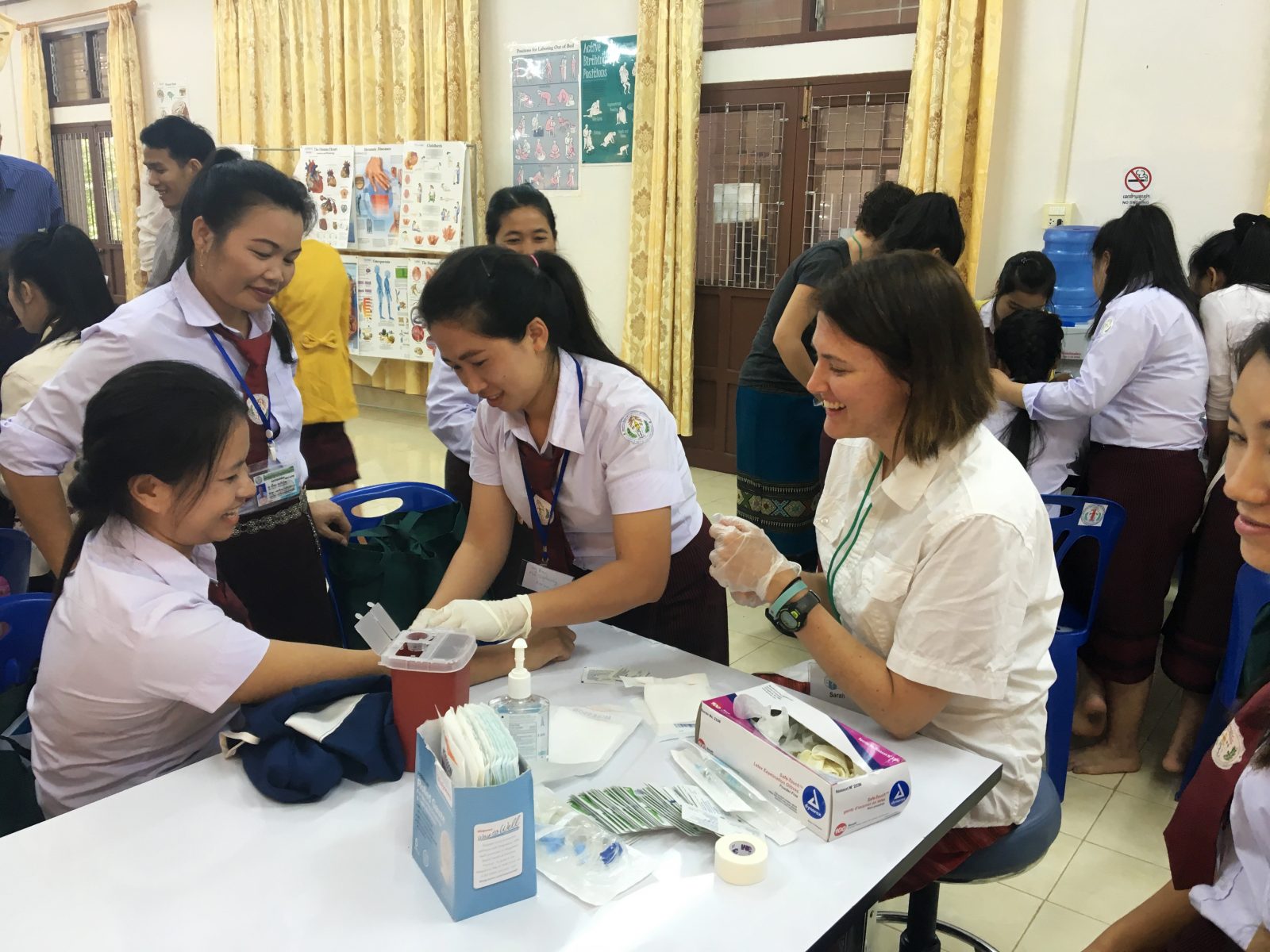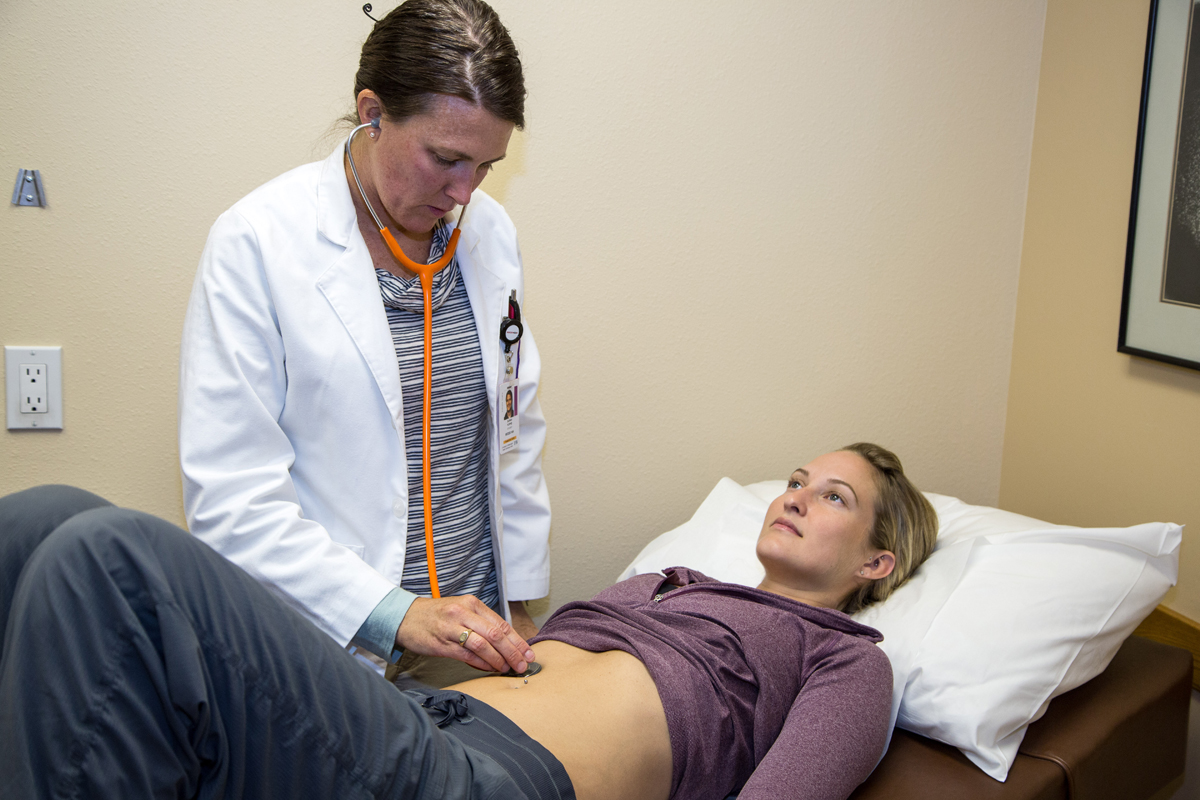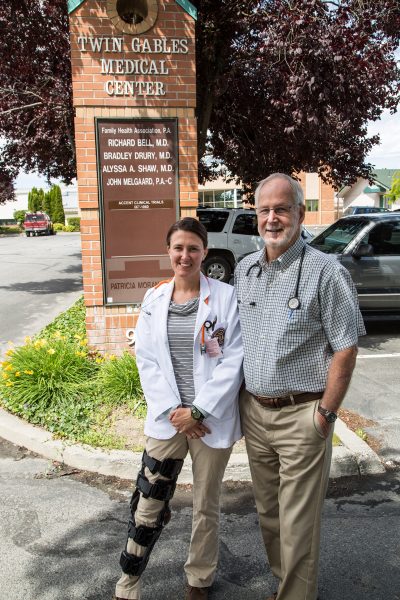Sarah Kopke is rounding the bend, ever closer to graduation from MEDEX Northwest and her new career as a physician assistant. There’ve been some obstacles along the way, most notably two knee surgeries that will delay receiving her diploma by three months. At the time of our visit, Sarah is fulfilling her family medicine preceptorship—a 4-month long preceptorship under John Melgaard, PA-C at Family Health Associates in Coeur D’Alene, ID.
This placement follows a rigorous series of six 1-month rotations designed to expose her to a wide range of medicine. Before that was a full year spent studying in the classroom. Still, her entry into the clinical rotations came as a shock to the system.
“I came in having studied really hard for multiple years, and then it didn’t feel like I knew anything at first,” she tells us. “Now of course, I do know something, but the things you don’t know tend to kind of outweigh the things you do know, or at least outshine them.”
Ah, the familiar terror of entering the clinical year. How obviously does my ignorance show through? Will I break the patient? Through it all, Sarah would hear her teachers say, “Trust in the process. Trust in the process! It will happen! You’ll get confidence, you’ll get skills, just give it time.”
Still, in contrast to the didactic year, this is much closer to where Sarah wants to be.
“After the first year of just being buried in a book and choosing to kind of ignore a lot of joy in life, the second year has been awesome. It’s been amazing to actually put into practice what I studied so hard for. And then it’s been a year of confidence-breaking, and breaking, and breaking, and then making, making, making. If you’re looking for a pat on the back, don’t look for it in clinical year.”
“After the first year of just being buried in a book and choosing to kind of ignore a lot of joy in life, the second year has been awesome. It’s been amazing to actually put into practice what I studied so hard for. And then it’s been a year of confidence-breaking, and breaking, and breaking, and then making, making, making. If you’re looking for a pat on the back, don’t look for it in clinical year.”
Prospective PA students, take notice. The work of physician assistant education can be challenging and ego deflating.
Sarah Kopke came to the MEDEX program after seven years as a physical therapist assistant. Her first rotation at MEDEX was in Sports Medicine at UW, so you’d think there’d be a lot of familiarity. “Even with my years of orthopedic experience, I still felt like a fish out of water,” she says. “Once in a while, there was a moment of, ‘Ooh, phew, I knew that!’ But that was my first introduction to flipping the roles, where I was the one asking questions, and the patient was presenting acutely, instead of running the show in a rehab setting.”
By her fourth rotation, this one in cardiothoracic surgery, Sarah was beginning to find her footing. It was at Rockwood Heart and Vascular Center where she worked under three preceptors: Dr. Hassan Tehrani and his two PAs, Torey Vail and Ted Banstetter. “This was very serious surgery,” she says. “Very engaging—you have to stay focused all the time.”
Dr. Tehrani and his team were extremely courteous and excellent examples of professionals. “They were always respectful of what I did or didn’t know,” she recounts. The team always encouraged questions, and gently pushed her to participate more in surgery.
“It was just a fantastic rotation,” she says. “It was incredible. It provided the transition that I’d been looking for to bring me from student to this PA professional. From there on out, that rotation was benchmark of a confidence-maker.”
An Internal Medicine rotation followed at Kootenai Health in Coeur D’Alene, Idaho. “That was another eye-opener,” Sarah tells us. “Hospitalists are really intelligent people, and as a student, you don’t feel intelligent on a daily basis.” She explained what it’s like to go into a room to examine the patient, to come out, present the case to your preceptor, and just totally mess up the case presentation. “It’s so messy as a student. First, you’re fixed on your case presentation, and then you have to interpret labs, present labs, and you don’t even know what that lab means to begin with!”
There’s a lot of research that goes into that kind of rotation. “There are moments where you really feel stupid, and acquire a big list of things to look up and learn when you go home that night. But once again, those little things you look up over time become a lot of stuff learned.”
Those two rotations—the cardiothoracic surgery and internal med—were back-to-back for Sarah. “They were my two most intense rotations, and the biggest periods of growth for me. Kind of roller-coasters, but necessary roller-coasters.”
“They were my two most intense rotations, and the biggest periods of growth for me. Kind of roller-coasters, but necessary roller-coasters.”
Logistically, these 1-month rotations have their inherent challenges as well. During the first week the student gets to know the facility’s system. “You scramble around a little bit, learn people’s names, and refine your patient exam skills,” Sarah says. “Second week, you think, ‘Okay, I’ve got this a little bit.’ But then inevitably, it’s like, ‘What? What does that person have?’ Or, ‘What is that medication?’ Or, ‘What is going on here?’ The third week, you really know people, you feel a little more confident. The fourth week, you’re golden and finally confident again, usually. And then you leave to start the process all over again somewhere else.”
Expectations are different as she enters her 4-month preceptorship with John Melgaard, PA-C at Family Health Associates. For one thing, it’s longer. “Just when you get rolling, you can keep rolling and build on it, and build on it, and build on it,” she says. “And not just build on your confidence, but build on the skills, build on your medication knowledge, and your exposure to different pathologies and personalities.”
All of this marks progress concerning Sarah’s abilities to assess and think critically, and she is reassured. This is just the beginning, she knows. She started a medical career once before as a PTA (physical therapist assistant). “Three months out of school, I was freaking out, thinking, ‘I have to go back to school, I don’t know anything!’ I hope that’s how I feel when I get out of MEDEX, because if you come out of school thinking you know everything—or at any point in life if you think you know everything—that is ridiculous.”
Early in her clinical year Sarah took part in a Global Health elective rotation that brought her to Laos for a month. There, she assisted the teaching faculty of the US-based NGO, Health Leadership International. Her topic of instruction and research, ‘Treatment and Prevention of Mortality from Common, Non-parasitic Causes of Diarrhea in Children Under-five Years in Southeast Asia and the Lao PDR,’ became the subject of her Capstone Project. This is a long-term investigative project and presentation that is a requirement of Sarah’s graduation from the MEDEX Masters program. “My formal education would not be complete without that Global Health rotation. I know I’m not the only one who feels that way about international rotations.”
You can read more about Sarah and her fellow MEDEX students’ Global Health rotation in Laos at https://depts.washington.edu/medex/magazine/physician-assistants-taking-lead-global-health-education/

Sarah at the right with students from the College of Health Sciences in Luang Prabang, Laos. In November 2015 she traveled to Laos with Health Leadership International as part of a Global Health elective rotation for MEDEX.
Because of the knee surgeries, Sarah will finish her family medicine preceptorship in October, a few months after her cohorts of Spokane Class 18. After graduation she will be participating in an emergency medicine training program for one year in her home state of Maine. “MEDEX has been so supportive,” she says. “They want to graduate you, obviously. They’ve been supportive not only through two different knee surgeries during this past year, but also in finding the right clinical situations for me. I also have to say a big thanks to Patty Hahn, RN, MN, ARNP, a Spokane instructor who was always a little bird in the back of my mind telling me I could do emergency medicine if I wanted to.”
Looking back, she speaks with great fondness of her cohorts from Spokane Class 18. “A class can be totally divided, or can really come together,” she says. “I feel like we are the latter. There’s a lot of buddies in my class, a lot of lifelong friends. Some of my best friends in life I’ve made through school situations. You’re thrown into these brain-boggling moments together, and frustrated that you don’t have a life, and sometimes you have to study this thing you’re not interested in but at least you can do that together. I definitely feel lucky to have the classmates I do, and look forward to continuing to see them in real life after school.”
























